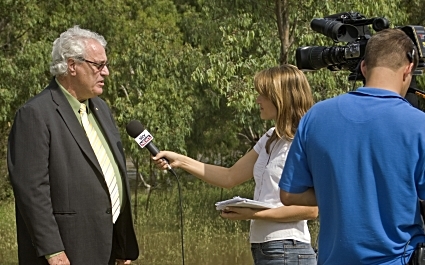Preparation Makes Tough Interviews Easier
Posted: June 10, 2014
[caption id="attachment_11915" align="alignright" width="425"] Photo: Radio Television Digital News Association[/caption]Let's face it – some interviews are much tougher than others. The right preparation and pre-interview groundwork can increase everyone's comfort level and make the interview seem much easier. Take the pressure off by following these helpful tips.
Photo: Radio Television Digital News Association[/caption]Let's face it – some interviews are much tougher than others. The right preparation and pre-interview groundwork can increase everyone's comfort level and make the interview seem much easier. Take the pressure off by following these helpful tips.
[caption id="attachment_11915" align="alignright" width="425"] Photo: Radio Television Digital News Association[/caption]Let's face it – some interviews are much tougher than others. The right preparation and pre-interview groundwork can increase everyone's comfort level and make the interview seem much easier. Take the pressure off by following these helpful tips.
Photo: Radio Television Digital News Association[/caption]Let's face it – some interviews are much tougher than others. The right preparation and pre-interview groundwork can increase everyone's comfort level and make the interview seem much easier. Take the pressure off by following these helpful tips.
Lynn Walsh, RTDNA Contributor, gives several ways to lay groundwork ahead of time and Make Tough Interviews Easier.
Interviews can be long, daunting and just plain hard sometimes.
Sometimes you are interviewing them about a controversial decision they made, putting them in a defensive position. Sometimes the subject area is so broad or complicated it is hard to understand in a couple sentences.
Because of all of the different scenarios we find ourselves in while talking to people, it always helps to find ways to make the situation a little more comfortable, especially when it comes to first meetings between two people.
Here are some tips to help make every interview a piece of cake and comfortable for everyone.
Be up front. Always be clear about what your interview is about, even in the most controversial or possibly confrontational situations. This does not mean you have to provide interview subjects with questions, but you definitely do not want to be misleading. This also does not mean you have to show all of your cards or discoveries, but you definitely do not want to ask for an interview under false pretenses. This is probably one of the best ways to guarantee future issues with the interview subject and lose their trust.
Take advantage of the phone interview. This can be extremely important when obtaining background information. A lot of what the person you are interviewing will say tends to be information you can say and tell viewers in your story; you really do not need them to say those things. Save the interview for solid sound bites that are engaging and will add to your story. Also, phone interviews allow you to build a rapport with the individual. A phone interview also allows you to understand and know more about what the person will say so you can ask more precise questions, which in return will get you better answers and quotes.
Try to relate. This is part of interviewing 101. Comment on what you see in their office or around them. Whether it is family, education or sport teams, people love to talk about their accomplishments. Ask them about what you are seeing. Congratulate them. If you have a connection, talk about it. Don’t let it take up too much time, but this will definitely help ease their nerves, if they have any, and it will also help you develop a relationship with them.
Keep to your time. Sometimes this is hard, especially if the interview is going really well, but always try to stick to the amount of time you sad it would take. If it is going well and you notice you are over the allotted time, then bring this up and make sure they are aware. Just as your time is precious, so is theirs. They will appreciate the courtesy.
Read the entire article, Make Tough Interviews Easier, at Radio Television Digital News Association.
© Copyright 2014 Radio Television Digital News Association | Journalism, Edward R. Murrow, First Amendment